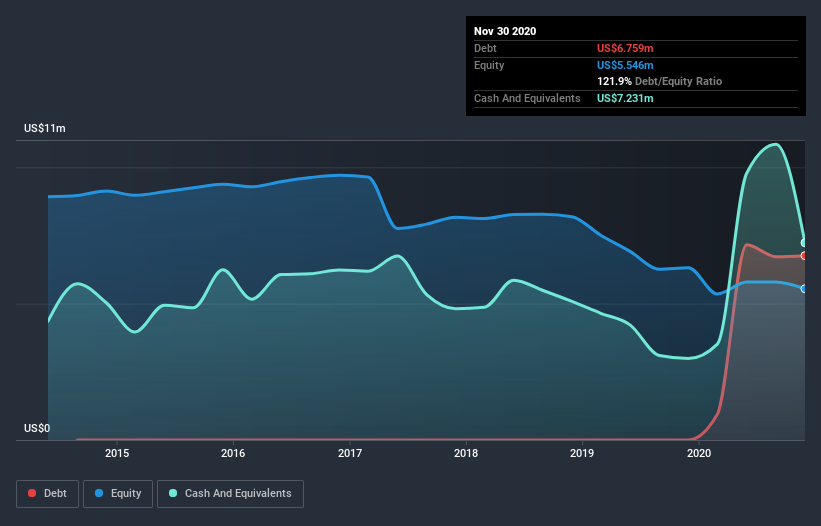Is TSR (NASDAQ:TSRI) A Risky Investment?
Some say volatility, rather than debt, is the best way to think about risk as an investor, but Warren Buffett famously said that 'Volatility is far from synonymous with risk.' When we think about how risky a company is, we always like to look at its use of debt, since debt overload can lead to ruin. We can see that TSR, Inc. (NASDAQ:TSRI) does use debt in its business. But should shareholders be worried about its use of debt?
When Is Debt Dangerous?
Debt assists a business until the business has trouble paying it off, either with new capital or with free cash flow. If things get really bad, the lenders can take control of the business. However, a more frequent (but still costly) occurrence is where a company must issue shares at bargain-basement prices, permanently diluting shareholders, just to shore up its balance sheet. Of course, plenty of companies use debt to fund growth, without any negative consequences. The first thing to do when considering how much debt a business uses is to look at its cash and debt together.
View our latest analysis for TSR
What Is TSR's Net Debt?
You can click the graphic below for the historical numbers, but it shows that as of November 2020 TSR had US$6.76m of debt, an increase on none, over one year. However, its balance sheet shows it holds US$7.23m in cash, so it actually has US$472.2k net cash.
A Look At TSR's Liabilities
Zooming in on the latest balance sheet data, we can see that TSR had liabilities of US$7.03m due within 12 months and liabilities of US$7.52m due beyond that. On the other hand, it had cash of US$7.23m and US$8.04m worth of receivables due within a year. So it actually has US$720.3k more liquid assets than total liabilities.
This surplus suggests that TSR has a conservative balance sheet, and could probably eliminate its debt without much difficulty. Succinctly put, TSR boasts net cash, so it's fair to say it does not have a heavy debt load!
Notably, TSR made a loss at the EBIT level, last year, but improved that to positive EBIT of US$168k in the last twelve months. The balance sheet is clearly the area to focus on when you are analysing debt. But you can't view debt in total isolation; since TSR will need earnings to service that debt. So when considering debt, it's definitely worth looking at the earnings trend. Click here for an interactive snapshot.
Finally, while the tax-man may adore accounting profits, lenders only accept cold hard cash. TSR may have net cash on the balance sheet, but it is still interesting to look at how well the business converts its earnings before interest and tax (EBIT) to free cash flow, because that will influence both its need for, and its capacity to manage debt. Happily for any shareholders, TSR actually produced more free cash flow than EBIT over the last year. There's nothing better than incoming cash when it comes to staying in your lenders' good graces.
Summing up
While it is always sensible to investigate a company's debt, in this case TSR has US$472.2k in net cash and a decent-looking balance sheet. And it impressed us with free cash flow of US$610k, being 363% of its EBIT. So we don't have any problem with TSR's use of debt. The balance sheet is clearly the area to focus on when you are analysing debt. But ultimately, every company can contain risks that exist outside of the balance sheet. For example, we've discovered 3 warning signs for TSR (1 is a bit concerning!) that you should be aware of before investing here.
If you're interested in investing in businesses that can grow profits without the burden of debt, then check out this free list of growing businesses that have net cash on the balance sheet.
This article by Simply Wall St is general in nature. It does not constitute a recommendation to buy or sell any stock, and does not take account of your objectives, or your financial situation. We aim to bring you long-term focused analysis driven by fundamental data. Note that our analysis may not factor in the latest price-sensitive company announcements or qualitative material. Simply Wall St has no position in any stocks mentioned.
Have feedback on this article? Concerned about the content? Get in touch with us directly. Alternatively, email editorial-team (at) simplywallst.com.

